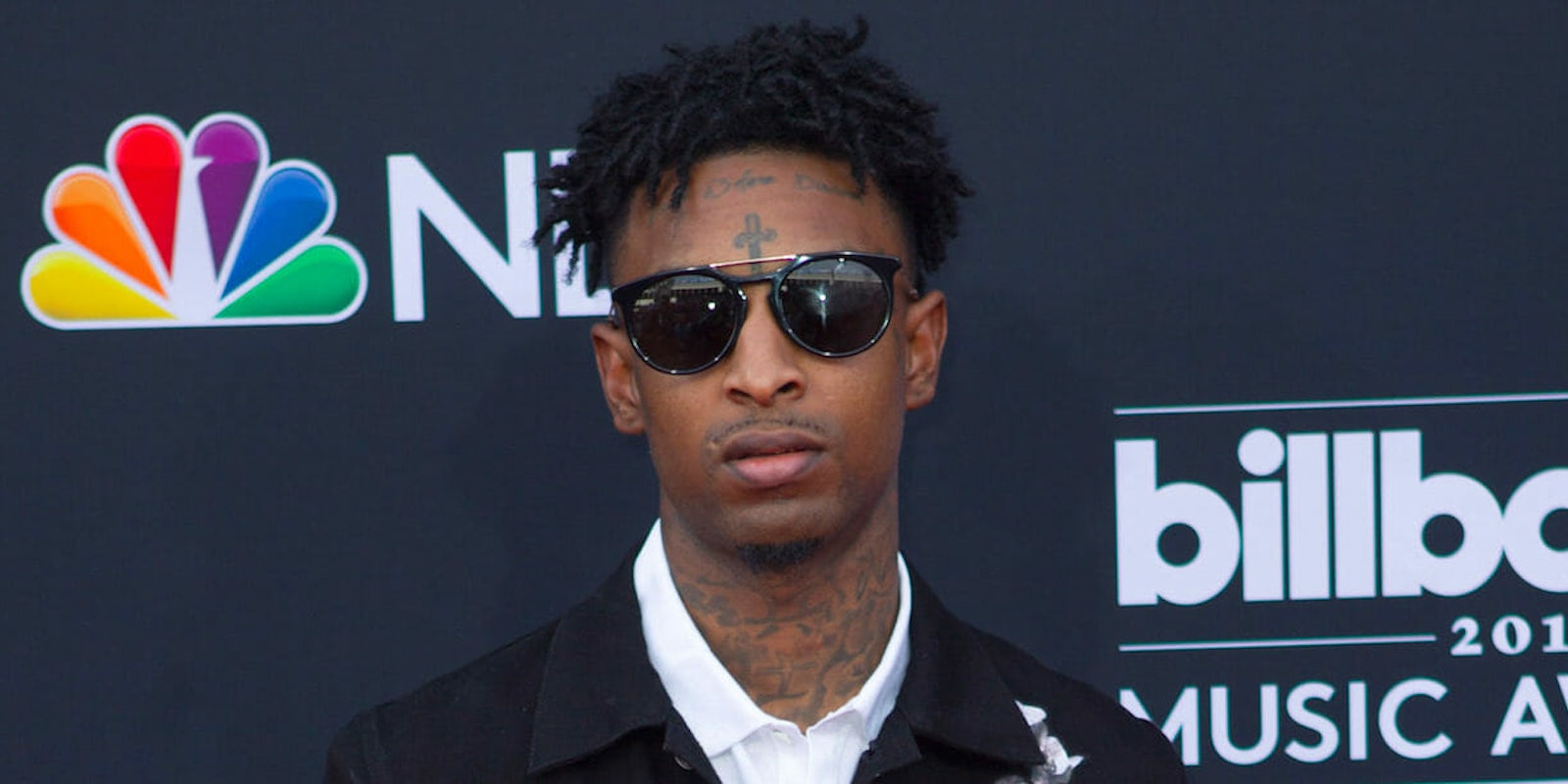Opinion
Early Sunday, rapper 21 Savage was detained by immigration officials in a “targeted operation,” according to U.S. Immigration and Customs Enforcement—and it doesn’t look like he will be released anytime soon.
ICE reported Savage, whose real name is She’yaa Bin Abraham-Joseph, is actually a British native who immigrated to the country with his family as a minor back in 2005. Lawyers representing the 26-year-old rapper released a statement on Monday confirming his family overstayed their work visas, but arguing Savage was “left without legal status through no fault of his own.” Without swift, serious (and unlikely) intervention, Abraham-Joseph will likely be tried and deported.
In response, an online petition was started by Black Lives Matter co-founder Patrisse Khan-Cullors and other social justice organizations, receiving over 100,000 signatures within a few hours. It demands ICE end deportation proceedings against the rapper and outlines the often overlooked fact that millions of undocumented Black immigrants, like Savage, face a similar fight.
“There are around 4.2 Million Black immigrants in the U.S.—619,000 are undocumented,” Khan-Cullors wrote. “Mr. Abraham-Joseph has been in the United States since he was a young child. Atlanta is his home… It is shameful that he and so many Black immigrants are separated from their families on a daily basis as part of the US’s heartless and racist immigration policies.”
While immigration and deportation issues have long been thought of as something that mostly affects Latinx people—that misconception further reinforced by President Trump’s Mexican border wall obsession—millions of Back people are impacted by immigration policies in the U.S. These are policies that have become more stringent, exclusive, and problematic for the demographic since Trump took office.
According to data released by ICE, the number of deported undocumented immigrants from African countries rose between 2016 and 2017. In fact, the top 10 African countries on ICE’s removals list jumped by 140 percent from 756 in 2016 to 1,815 in 2017. The three countries that experienced the greatest spikes are Senegal (from 21 to 197), Gambia (from 2 to 56), and Guinea (from 16 to 88).
This trend is less of a surprise and more of a confirmation. Many anticipated the rise in the targeting of Black immigrants, given Trump’s reported commentary about African countries. Back in 2018, while speaking to 23 members of Congress during a DACA meeting at the White House, it is reported that Trump repeatedly referred to African countries as “shitholes” and also questioned why America let Haitian immigrants into the country. His statement sparked controversy and he immediately denied his use of the expletive.
“The language used by me at the DACA meeting was tough, but this was not the language used,” he tweeted.
The language used by me at the DACA meeting was tough, but this was not the language used. What was really tough was the outlandish proposal made – a big setback for DACA!
— Donald J. Trump (@realDonaldTrump) January 12, 2018
Regardless, the government’s stance on Black immigration has been made very clear: Black immigrants are not wanted in this country. This puts undocumented Black immigrants in an excruciatingly precarious situation. Already more vulnerable to arrest by law enforcement (which increases the chances of an ICE encounter) because of racist policing practices that target people of color, undocumented Black people have fast become the demographic most likely to face abuse and deportation. Yet, the narrative surrounding immigration issues in America seldom includes the enduring hardships Black immigrants face while trying to be free in the land of the free.
For example, images of Latinx families being torn apart by Trump’s “zero tolerance” immigration policy shed light on the cruel practice of separating children from their parents at the U.S. Southern Border and launched the country into very necessary debate. What was absent from that conversation, however, was the process by which Black immigrant families find themselves in similar predicaments. African immigrants tend to migrate as family units, but upon arrival to the U.S., it is very common for men to be separated from their families. Laura Messenger, a case worker for Posada Esperanza, a housing program with a large Black immigrant population, highlighted this plight in an interview with the Texas Tribune:
“When you think of family separation, you think of children being separated from their parents— that’s what everyone has been talking about,” she explained. “But what we’ve seen a lot this year and what we have been seeing for the past two is our women and children here being separated from their husbands and fathers who are still in detention.”
There needs to be more space for Black voices and faces in the immigration reform conversation. It is for this reason the images of Therese Patricia Okoumou, a Black woman who immigrated from the Republic of Congo, scaling the Statue of Liberty last year on July 4th in protest of the mistreatment of immigrant children was so important. While this nation continues to grapple with the government’s unfair treatment of immigrants at the country’s southern border, it needs to simultaneously begin to seriously address the broad inequalities faced by Black immigrants, Muslim immigrants—all immigrants who don’t have white skin—as well.
https://twitter.com/newyorknewart/status/1014617572728328192?
The very publicized detention (and perhaps even deportation) of rapper 21 Savage presents a unique opportunity for the public to reframe this country’s narrow view of who is impacted by unfair immigration policy—and unify to put an end to it.


